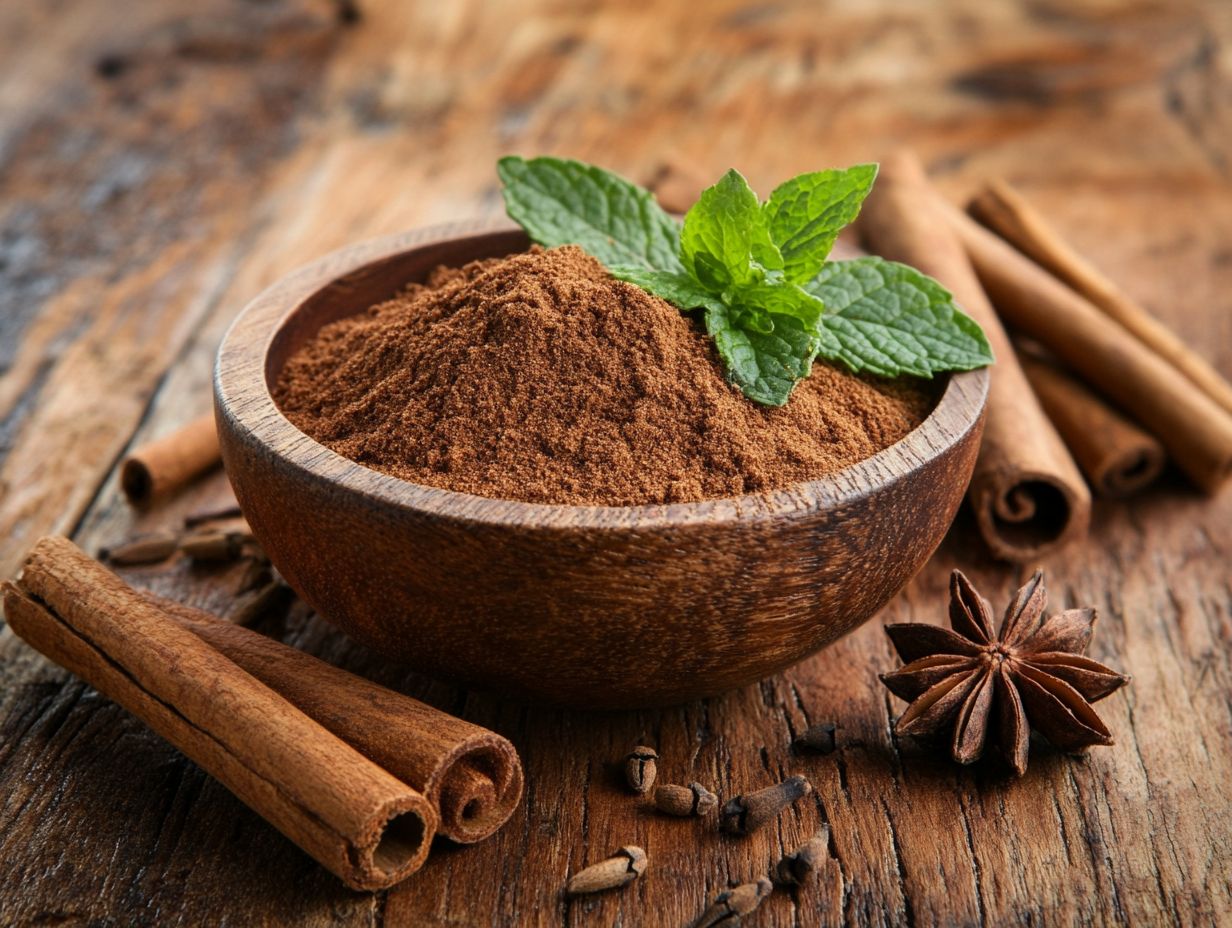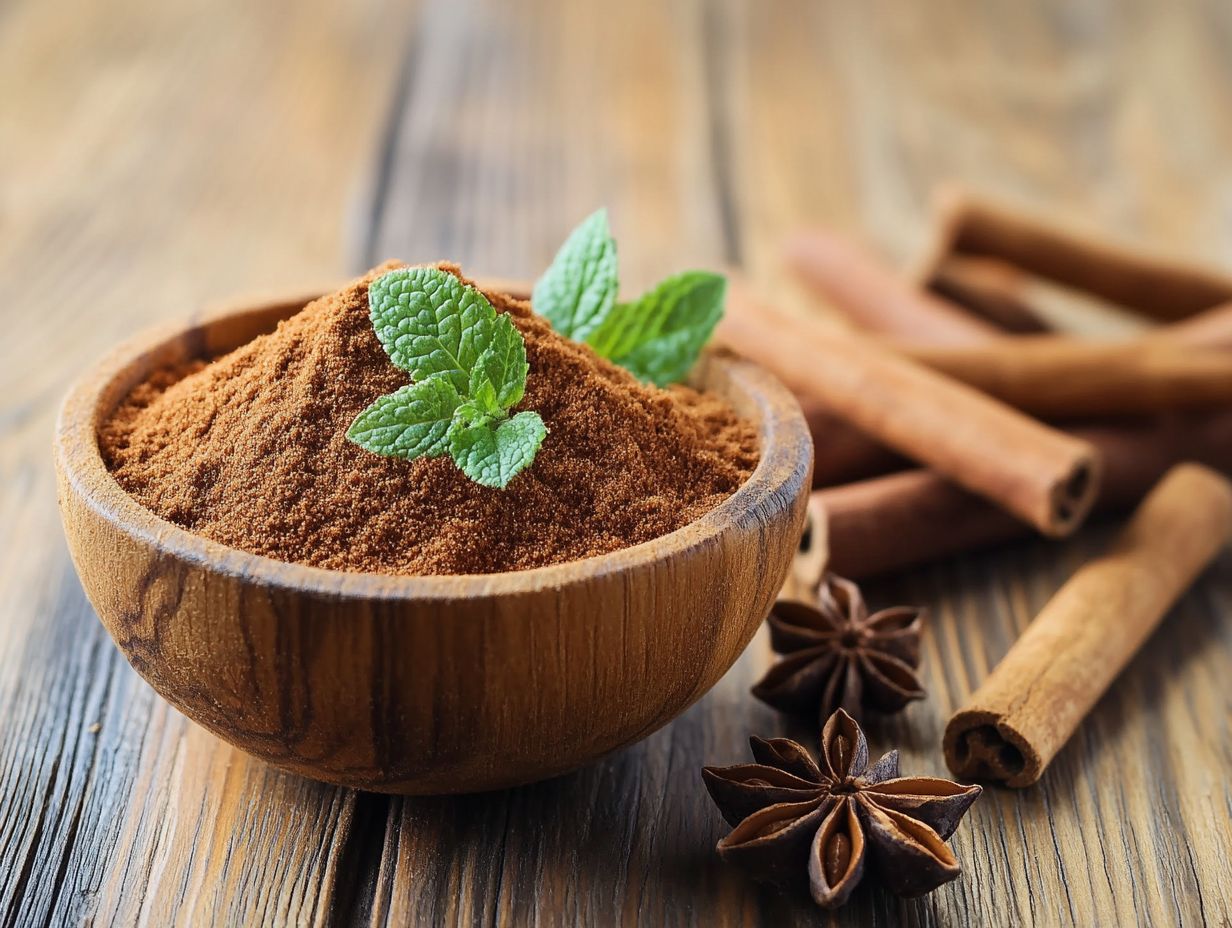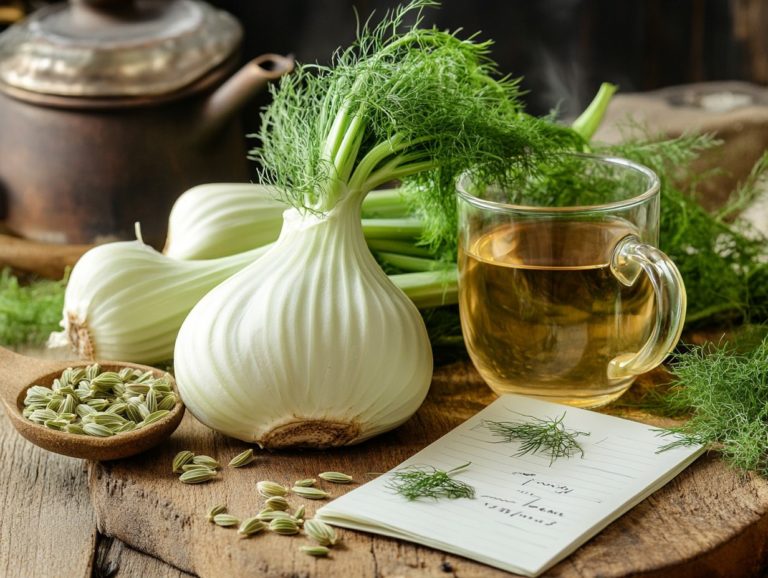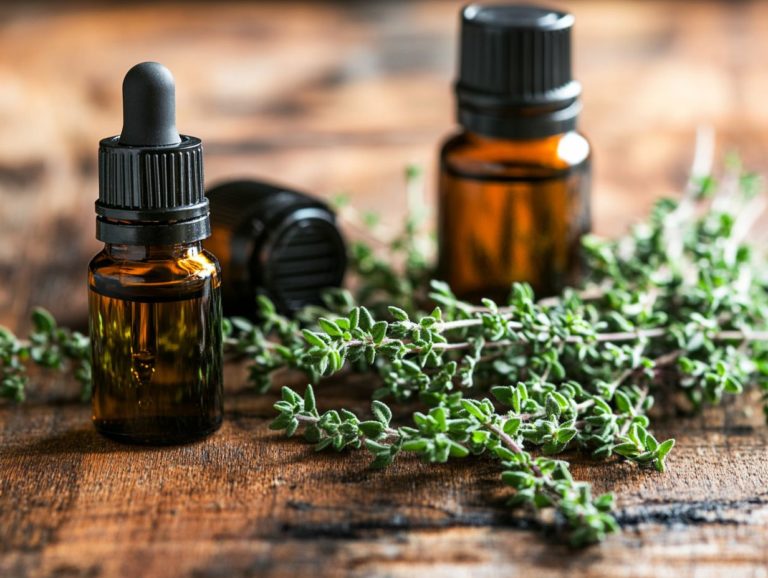Cinnamon: Health Benefits Beyond Flavor
Cinnamon is an amazing spice that does more than just enhance your dishes; it s a powerhouse of health benefits that has been cherished for centuries! It boasts antimicrobial properties and supports brain health.
This exploration unveils the numerous advantages of incorporating cinnamon into your diet. You’ll discover its impressive anti-inflammatory and antioxidant properties, along with its remarkable ability to improve insulin sensitivity and lower cholesterol levels.
We’ll share creative ways to incorporate cinnamon into your meals, along with essential precautions to keep in mind, particularly regarding its impact on blood sugar and cholesterol levels.
Don’t miss out on these incredible benefits! Uncover how this aromatic spice can elevate your well-being and add an extraordinary touch of flavor to your life!
Contents
Key Takeaways:

- Cinnamon is more than just a flavor booster it’s a health hero, offering anti-inflammatory and antioxidant properties.
- Regularly adding cinnamon to your diet can improve insulin sensitivity and lower cholesterol levels, making it a valuable addition to your meals.
- Cinnamon is mostly safe, but be sure to check its effects on your medications and follow recommended dosages for optimal health benefits!
What is Cinnamon?
Cinnamon, sourced from the inner bark of the cinnamon tree, is an aromatic spice with a rich history and extensive use in traditional medicine across various cultures. This delightful spice falls mainly into two categories: Ceylon cinnamon, often dubbed ‘true cinnamon,’ and Cassia cinnamon, which you re likely to find on supermarket shelves. Beyond its culinary appeal, cinnamon is packed with health benefits and has been the focus of countless scientific studies examining its properties and potential therapeutic effects.
Dating back to ancient Egypt, cinnamon has occupied a prestigious position in global trade, valued not just for its flavor but also for its preservative qualities. The harvesting process is a delicate art; it involves carefully stripping away the outer bark, allowing the inner bark to curl up and dry into the familiar rolls you recognize today.
When you compare Ceylon and Cassia cinnamon, you’ll notice distinct differences. Ceylon, with its lighter hue and more subtle flavor, is often chosen for sweet dishes, while Cassia, boasting a bolder taste and higher levels of coumarin a natural compound that can affect liver health is typically used in savory recipes. These variations not only guide your culinary decisions but also influence their medicinal applications, with Ceylon being deemed safer for long-term use. By understanding these nuances, you can elevate both your cooking and health practices.
Health Benefits of Cinnamon
Cinnamon isn t just a delightful spice that enhances both sweet and savory dishes; it also boasts a wealth of health benefits that have been celebrated for centuries. Research highlights that cinnamon can significantly assist in managing blood sugar levels, enhancing insulin sensitivity, and improving cholesterol levels. This makes it an invaluable ally in the prevention of chronic diseases like type 2 diabetes and metabolic syndrome.
Cinnamon also has abundant antioxidant and anti-inflammatory properties that further enhance its therapeutic potential, making it a remarkable addition to your culinary and wellness repertoire.
Anti-inflammatory Properties
Cinnamon is known for its remarkable health benefits. It helps reduce chronic inflammation, which can lead to heart disease and arthritis.
Research shows that bioactive compounds in cinnamon, like cinnamaldehyde and eugenol, interact with cellular pathways to suppress inflammation. These compounds inhibit pro-inflammatory markers and support beneficial bacteria in your gut.
A study published in Plos One revealed that cinnamon supplementation significantly increases beneficial bacteria populations while reducing harmful strains. This could enhance your body’s ability to fight inflammation, positively impacting metabolic health and immune function.
By adding cinnamon to your daily diet, you may adopt a natural approach to lowering risks associated with chronic diseases, including heart health issues and cognitive decline.
Antioxidant Effects
Cinnamon is packed with antioxidants. These help neutralize harmful free radicals in your body.
Among these antioxidants are polyphenols and cinnamaldehyde, which work together to reduce inflammation and lower blood sugar levels. They effectively alleviate oxidative stress, which can lead to serious conditions like heart disease, diabetes, and cancer.
Regularly incorporating this aromatic spice into your diet can enhance your body s defense mechanisms. It promotes longevity and well-being while improving metabolic function and disease prevention.
Improving Insulin Sensitivity

Cinnamon enhances insulin sensitivity, offering a natural solution for managing blood sugar levels, especially for those with type 2 diabetes. Research indicates that incorporating cinnamon into your diet may lead to lower fasting blood glucose levels.
The magic lies in compounds like cinnamaldehyde, which boosts glucose uptake in your cells and inhibits glucose production in the liver. A meta-analysis published in Nutrition demonstrated that cinnamon supplementation can significantly lower hemoglobin A1c levels, showcasing improved long-term blood sugar control.
Consider adding cinnamon to your meals or beverages as a straightforward approach, especially if you’re at risk of chronic diseases. This delightful spice elevates flavor while serving as a natural anti-inflammatory, further supporting your metabolic health.
Lowering Cholesterol Levels
Cinnamon is known for lowering cholesterol levels. It impacts both LDL cholesterol (the bad type) and HDL cholesterol (the good type), as well as triglycerides. By incorporating cinnamon into your daily routine, you may enhance your heart health and reduce your risk of cardiovascular diseases.
Research has shown that adding this spice to your diet can effectively lower harmful LDL cholesterol while simultaneously boosting beneficial HDL levels. For example, a randomized control trial demonstrated that participants who included cinnamon in their daily meals experienced a notable decrease in triglyceride levels. This highlights the spice’s potential to promote a healthier lipid profile.
These changes are essential, as maintaining balanced cholesterol levels is crucial for preventing arterial blockages and minimizing the risk of heart attacks or strokes. By seamlessly integrating cinnamon into your meals or beverages, you can take proactive steps toward enhancing your cardiovascular wellness.
How to Use Cinnamon
Incorporating cinnamon into your diet offers a simple yet delightful way to unlock its myriad health benefits, including enhancing your digestive health and boosting antioxidant content. Whether you choose to sprinkle cinnamon powder into your favorite recipes or blend it into beverages, you ll discover countless opportunities to savor this versatile spice.
Embracing cinnamon not only enhances your culinary creations but also supports your gastrointestinal health and overall well-being.
Recipes and Ideas
- Cinnamon Sugar Pretzels: A delightful snack that merges the warm essence of cinnamon with the satisfying crunch of pretzels. It s an irresistible choice for any occasion.
- Fluffy Cinnamon Pancakes: These breakfast favorites introduce warmth and depth to every bite.
- Creamy Cinnamon Oatmeal: Perfect for those chilly mornings.
- Spiced Cinnamon Latte: Rich espresso meets foamed milk, topped off with a sprinkle of cinnamon for a truly aromatic experience.
- Cinnamon Swirl Muffins: Featuring a sweet, gooey center that s perfect for snacking.
Whether you choose the subtly sweet Ceylon cinnamon or the bolder flavor of Cassia cinnamon, these recipes vividly illustrate how this spice elevates a variety of culinary creations, making each dish a memorable experience.
Possible Side Effects and Precautions
Cinnamon is typically safe for most individuals, but it s crucial to be mindful of potential side effects and interactions with any medications you may be taking. Some may experience digestive issues or allergic reactions.
By understanding the recommended dosage, you can fully embrace the health benefits of cinnamon while minimizing the risk of any adverse effects.
Interactions with Medications

Cinnamon has the potential to interact with certain medications, especially those involved in blood sugar management and insulin therapy. For individuals with type 2 diabetes, understanding these interactions is essential, as improper combinations could lead to undesirable fluctuations in blood sugar levels.
For example, when cinnamon is taken alongside medications like metformin or sulfonylureas, which are designed to lower blood sugar, it might amplify their effects, increasing the risk of hypoglycemia. Insulin itself can also be influenced, making careful monitoring imperative.
If you re considering adding cinnamon to your diet, it s crucial to consult with healthcare professionals. They can offer tailored advice that takes into account your unique health conditions and current treatment plans. This careful approach ensures you can safely and effectively manage your diabetes while incorporating herbal remedies into your routine.
Talk to your doctor today about safely adding cinnamon to your routine for better health!
Recommended Dosage
The recommended dosage of cinnamon can vary based on how you choose to enjoy it, whether in powder form or as a dietary supplement. Experts generally suggest that up to 1 teaspoon of cinnamon powder per day can be beneficial for your health without any associated risks.
If you’re considering cinnamon supplements, a daily intake of 200 to 400 mg of Ceylon cinnamon extract is often advised, especially if you’re looking to manage blood sugar levels or enhance heart health.
It’s essential to recognize that dosages may differ depending on specific health conditions. For instance, if you have diabetes, you might benefit from higher concentrations of cinnamon, while those with liver concerns should consult a healthcare professional before significantly increasing their intake.
Incorporate cinnamon into your balanced diet to elevate the flavor of your meals and enjoy notable health benefits, including antioxidant support and anti-inflammatory effects.
Summary of Cinnamon’s Health Benefits
Cinnamon emerges as a truly exceptional spice, brimming with health benefits such as antioxidant support, improved insulin sensitivity, and effective cholesterol management. Its anti-inflammatory properties play a crucial role in preventing chronic diseases, making it an invaluable addition to your healthy diet.
By weaving this versatile spice into your daily routine, you can enhance the flavor of your meals while significantly elevating your overall well-being. Its remarkable qualities especially its ability to stabilize blood sugar levels and promote gut health make it critical for anyone keen on supporting their metabolic functions.
Exploring various ways to incorporate cinnamon into your diet, whether sprinkled on oatmeal, blended into smoothies, or featured in savory dishes, can lead to a more delicious and health-conscious lifestyle. Embracing cinnamon can dramatically transform your health!
Frequently Asked Questions
What are the health benefits of cinnamon beyond flavor?
Cinnamon has been used for its medicinal properties for centuries. It contains powerful antioxidants and anti-inflammatory compounds that may offer numerous health benefits beyond just adding flavor to your food.
Can cinnamon help lower blood sugar levels?

Studies have shown that cinnamon may positively affect blood sugar levels by increasing insulin sensitivity, which helps regulate blood sugar and may be beneficial for those with diabetes.
Is cinnamon effective in reducing inflammation?
Yes, cinnamon contains anti-inflammatory properties that may help reduce inflammation in the body. This can be beneficial for those with conditions such as arthritis and other inflammatory diseases.
How does cinnamon improve heart health?
Cinnamon has been found to positively impact heart health by helping to lower cholesterol levels and regulate blood pressure, both of which are important for maintaining a healthy heart.
Can cinnamon help with weight loss?
While cinnamon alone won’t lead to weight loss, it may help regulate blood sugar levels, which can prevent cravings and promote a healthy metabolism.
Is cinnamon safe to consume in large amounts?
In general, cinnamon is safe to consume in moderate amounts. However, taking large amounts of cinnamon supplements or consuming high doses of the spice may have adverse effects. It’s always best to consult with a healthcare professional before making significant changes to your diet.
Start incorporating cinnamon into your meals today for a healthier you!






